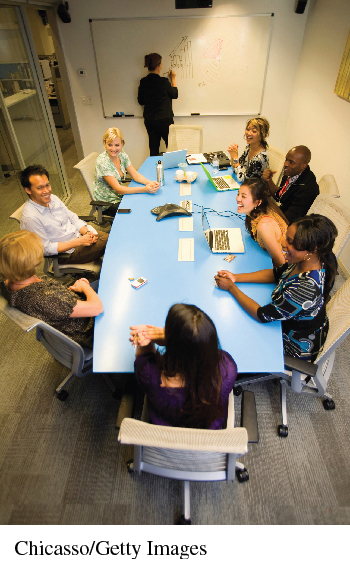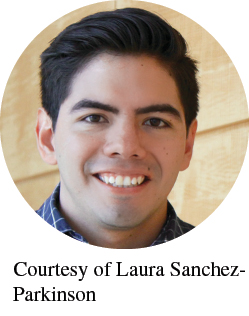Connect with Others at Work
Connecting with others not only benefits you in college but is also crucial to career success. When you know how to build and maintain healthy, positive relationships with other people in a work setting, you’re more likely to get the job of your dreams — and then excel at it once you’re hired.
ACTIVITY: If your college has a career center, have students schedule a mock interview. Explain that they’ll need to dress professionally and show up prepared to answer questions typical of a job interview (“Tell me about yourself,” “Where do you see yourself in five years?”).
Impress an Interviewer or Employer

Try these tips for making a good impression when you’re looking for a job and once you’ve joined an organization’s ranks.
ACTIVITY: Ask students to review their social media postings for potentially unprofessional material. What steps can they take to make their profiles more professional?
Ace the interview. Arrive early for a job interview, make good eye contact, and use a firm handshake to communicate your interest, enthusiasm, and respect. In addition, listen actively to the interviewer, ask relevant questions, and clearly state your skills and career goals.
Maintain professionalism through social media. Be aware that potential employers may review your posts on social media to assess your professionalism, integrity, and ethics, so make sure they’ll like what they see if they access your profile.
Leverage your existing relationships. Relationships you’ve already built can help you get a job. For instance, a classmate might know of a job opening that interests you. Or your instructors may give you letters of recommendation to share with interviewers.
Further your career. Once you have a job, use your connection skills to advance in your career. For example, to negotiate a raise with your boss, use assertiveness to explain what value you bring to the organization and why you deserve a pay increase. Or clearly describe your career goals, including a promotion you’re eyeing, and ask for “stretch assignments” — challenging work that lets you build the skills needed for the higher-level role you want.
Work Effectively with Colleagues
In a work setting, differences in personality, goals, work styles, and ability can spark disagreements. Supervisors know that conflict can erode productivity, so they expect coworkers to get along. The skills laid out in this chapter can help you manage these conflicts. Here are some suggestions.
Bridge cultural gaps. Your colleagues or clients may come from many places around the globe. Learn about their homeland and customs, such as holidays and cuisine. If you sense that you may have offended someone unintentionally, apologize and ask for feedback on your behavior. Use this feedback to improve. And if someone unintentionally offends you, use “I” statements to gently enlighten him or her.
Offer feedback sensitively. At some point in your career, you may be asked to supervise someone or manage a project. In this role you’ll need to give others feedback so that they can improve their performance. To provide such feedback, let them know what they’re doing well before offering criticism. And frame your feedback in terms of behavior they can change (“I need you to arrive at meetings on time”) versus a character attack (“You don’t care about this project”). Offer support and suggestions for how they can make the desired change in behavior.
Avoid gossip. It’s fun to talk and laugh with people at work, but try to steer clear of office gossip. Gossip erodes morale and can get you in trouble. So talk about entertaining topics with your coworkers, but don’t repeat confidential news or make fun of others behind their back.
voices of experience: employee
BUILDING RELATIONSHIPS

| NAME: | Carlos Robles |
| PROFESSION: | Research Assistant |
| SCHOOL: | Loyola University Chicago |
| DEGREES: | Associate of Arts; Bachelor of Science |
| MAJORS: | Secondary Education; Spanish |
“Building interpersonal relationships has been critical in helping me to grow as a professional.”
Building interpersonal relationships has been critical in helping me to grow as a professional. One of the reasons I was able to get my first job was because of relationships I had built in college. I learned of the job opening through a classmate, and several of my professors had worked there, so they provided strong recommendations that helped me get the job.
Building interpersonal relationships has also helped me further my education. When I decided to go back to college to work on my master’s degree in public policy, I called upon professors from my undergraduate years and asked them to write me letters of recommendation. I also relied on my professors and the executive director at a former job to help me explore career options and where to go for grad school. These connections have been instrumental in helping with my career search.
Now that I’m in grad school I continue to build meaningful working relationships that might help me in the future. Right now I work at the National Center for Institutional Diversity doing research on how to increase access to higher education. In my job, I develop programs that bring prominent speakers to campus to talk about educational equality. Not only am I learning from these amazing professionals, I’m also building relationships with very well-known speakers who might be great connections later in my career.
YOUR TURN: If you’re employed, did you leverage relationships to learn about your current job opportunity and to get the job? If so, how? If you’re currently seeking a particular job, how might your existing relationships help you?